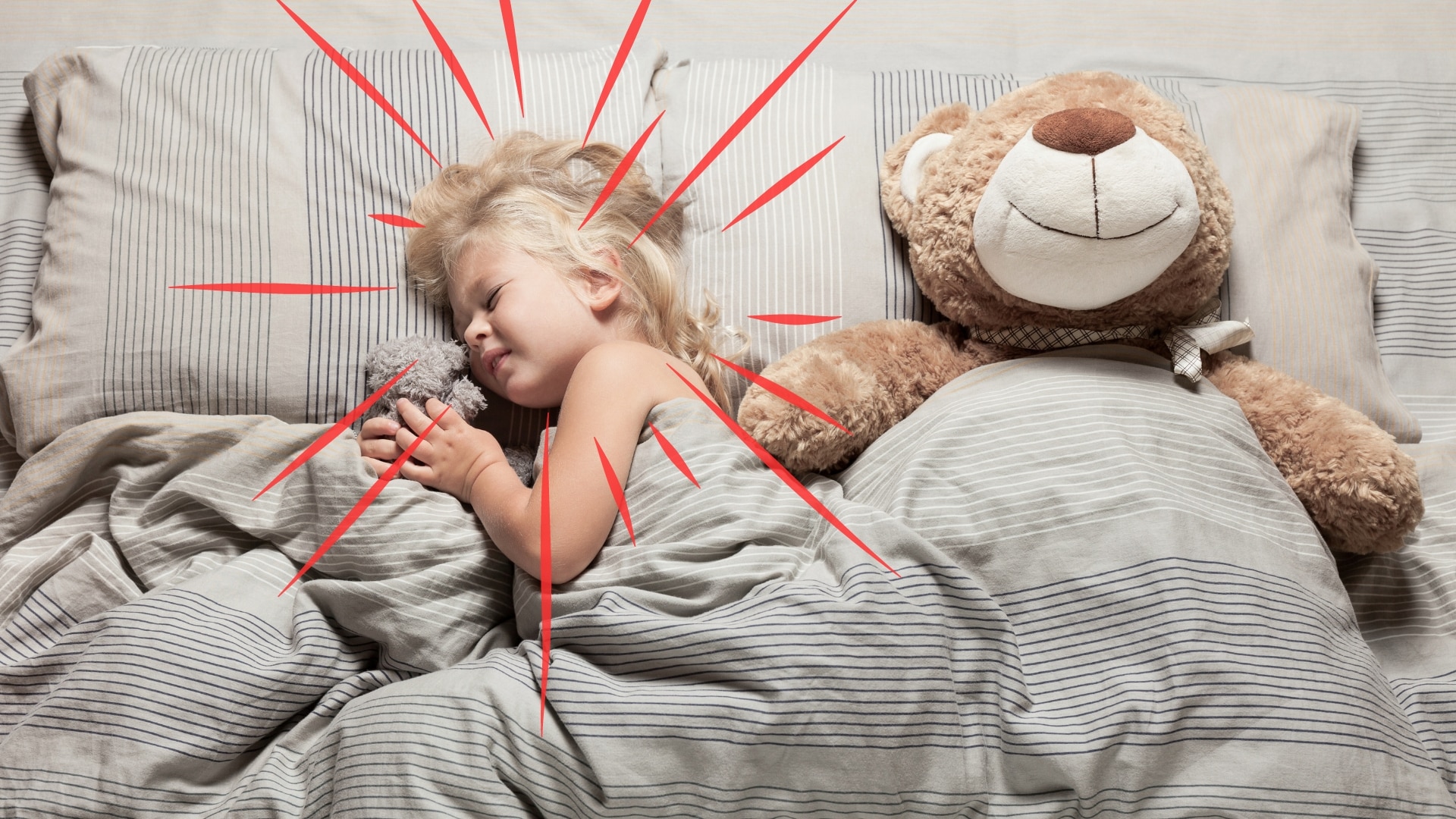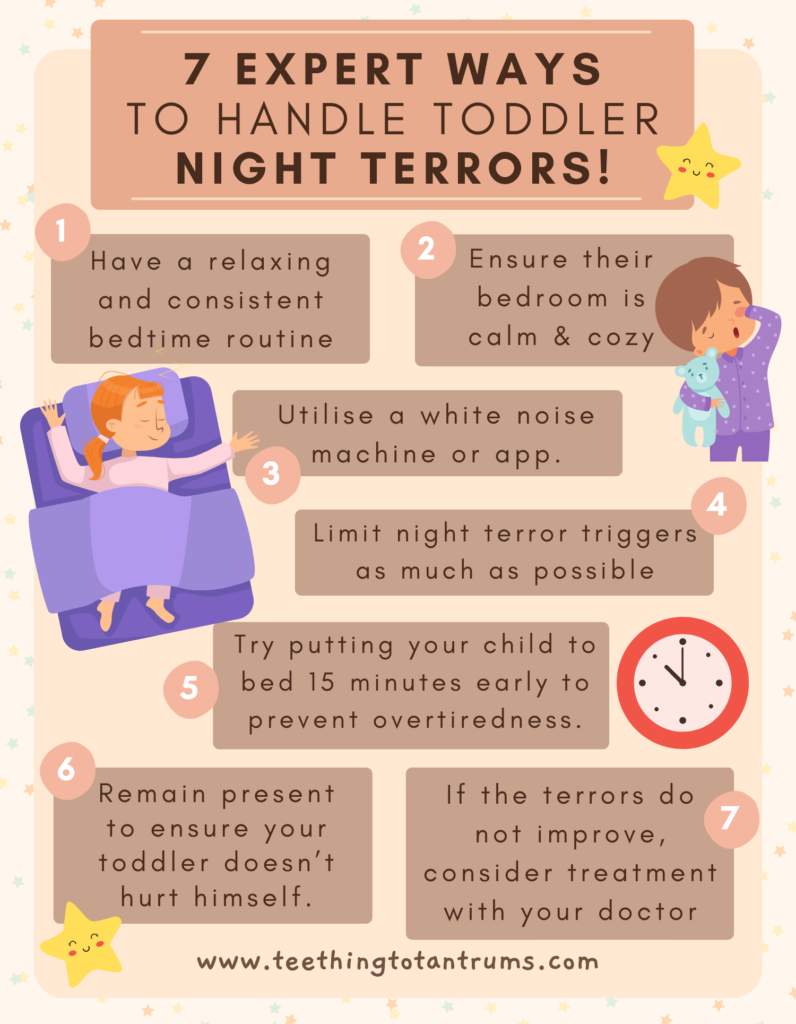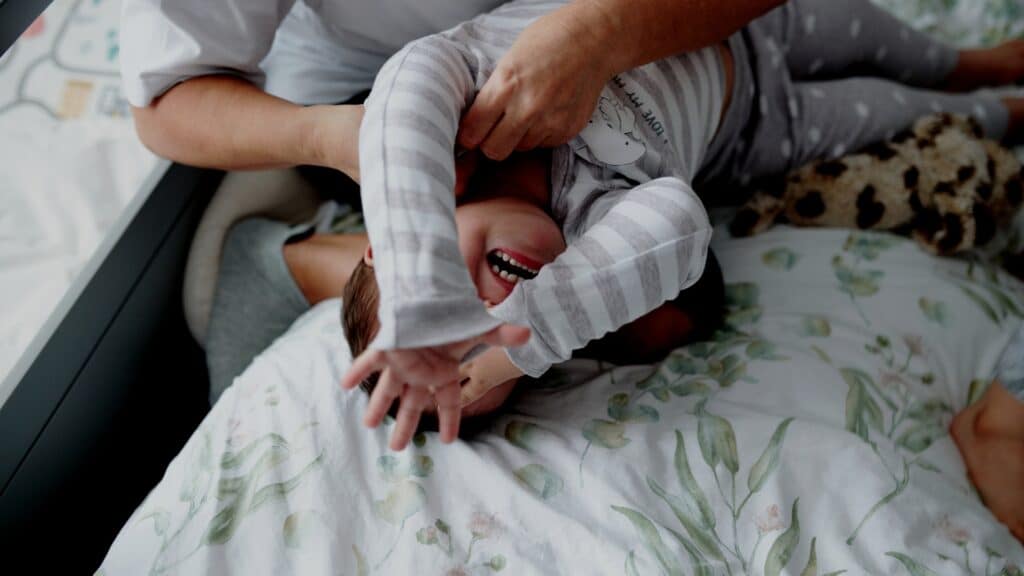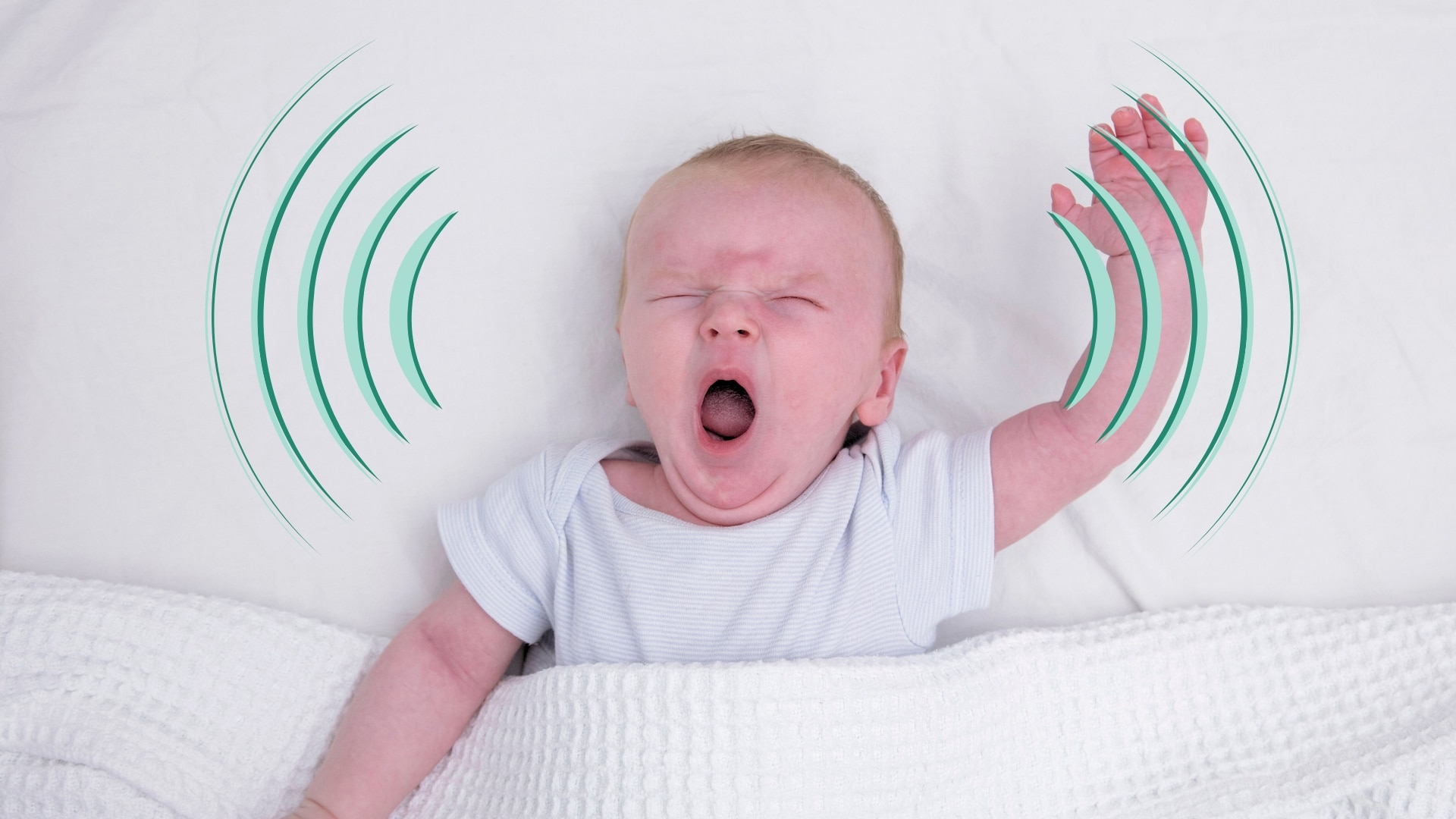Night terrors are among some of the common night disturbances that young children can experience along with nightmares and sleepwalking.
And as alarming as they can be for you, night terrors in toddlers are completely normal.
With first-hand experience dealing with night terrors, combined with over 40 years of childcare experience… I want to share all of my tips, tricks, and golden nuggets of information so you understand what night terrors are, what causes them, and how you can help your children through them… Let’s get started.

Table of Contents
Understanding Night Terrors In Toddlers
Night terrors are episodes of intense fear and distress that occur during sleep. They occur most often in toddlers and preschoolers and typically happen during the first few hours of sleep. Night terrors in toddlers are usually over in less than 10 minutes, but some can last up to 45 minutes.
I know from first-hand experience how disturbing night terrors can be for a parent, as my son suffered from night terrors as a toddler.
It is quite bizarre to see your child seemingly awake and in apparent distress… but not acknowledge your presence and try to push you away if you attempt to comfort them.
However, night terrors in children are more common than you think, and there are strategies to help you and your little one rest easy.
What Age Do Night Terrors Start?
Night terrors are most common in children between the ages of 3 and 8 years old, peaking between the ages of 4 and 6 years.
Occasionally, night terrors can start in toddlers as young as 1-2 years old. But most children will outgrow their night terror episodes by adolescence.
Are Night Terrors Common?
Yes, night terrors are more common than most people think. Statistically night terrors are more frequent in younger children, with up to 35% of children aged 1.5 years old experiencing them.
They can occur sporadically or frequently, with the frequency of night terrors varying from child to child.
If your toddler experiences night terrors, it is important to remember that they are not harmful and will generally resolve on their own. My son experienced them for a few weeks only and then they stopped completely.
Looking to get your little one to sleep quickly and effortlessly? Check out my Bedtime and Nap Cheat Sheet and master the art of making daytime naps and bedtimes as seamless as possible.
A bedtime & nap cheat sheet so good your little one will ask you to put them to bed...
Laura Williams "This is a life saver! I'm so glad I downloaded your bedtime & nap cheat sheet. My little one actually asked me to put him to bed last night! Unbelievable! Thank you so much!"
Click Here For The FREE Cheat Sheet
7 Ways To Prevent and Manage Night Terrors In Toddlers
Night terrors can be distressing for both you and your child. I know I was very concerned when I witnessed my son having them!
And while toddler sleep terrors usually go away on their own, there are steps you can take to prevent and manage them.
Here are my top remedies for night terrors in toddlers:

- Bedtime Routine. Establishing a relaxing bedtime routine can help your child fall asleep more easily. Try to stick to a consistent bedtime and wake-up time, even on weekends.
- Create a Calm Environment. Make sure your child’s bedroom is a calm and comfortable environment. Keep the room cool, quiet, and dark. Avoid stimulating activities before bedtime and restrict screen use in the lead-up to bedtime.
- Use a White Noise Machine. A white noise machine will make sure your little one is not disturbed by noises that may trigger a night terror.
- Avoid Triggers. Identify and avoid any triggers that cause your child’s night terrors. This could include separation anxiety, medications, or a big change that has happened in their routine recently such as starting daycare or preschool, the arrival of a new sibling, or moving house.
- Try Putting Your Child to Bed Earlier. If your toddler or preschooler is overtired they are more likely to experience night terrors. Try putting your child to bed earlier to ensure they are getting enough age-appropriate daytime sleep.
- Stay Calm and Remain Present. During a night terror the best thing you can do as a parent is to sit quietly by your child until the terror is over to ensure they do not hurt themselves and wait for them to go back to sleep.
- Consider Treatment for Night Terrors. In most cases, night terrors do not require treatment. However, there are a couple of medical conditions that can trigger night terrors such as Obstructive Sleep Apnea and Reflux. If your toddler has the following symptoms, you should talk to your doctor about treatment plans (usually therapy or medication) to address any underlying issues:
- Your little one is stressed or fearful during the day
- The night terror lasts more than 30 minutes or more than once a week
- Your little one is snoring or has frequent burping
- They are jerky or stiffening during the night terror
Remember, night terrors are usually not a cause for concern and more often than not, will go away on their own.
TOP TIP: If your toddler is having night terrors around the same time every night, you can try waking them up 15-30 minutes before the “terror time” to see if it prevents the episode. Sometimes, this can help to break the night terror habit.
What Are The Signs Of Night Terrors In Toddlers?
If you are trying to determine if your toddler is experiencing night terrors here are some specific signs to look out for:
- Physical Signs. During a night terror, your child may exhibit physical signs such as sweating, thrashing about, rapid breathing, and a racing heartbeat. They may also appear to be in a state of panic, with dilated pupils and a tense body.
- Vocalizations. Your child may scream, cry in their sleep, or make other loud noises during a night terror. If you try and engage in conversation they will not respond coherently.
- Unresponsiveness. During a night terror, your child will most likely not respond to your attempts to comfort them or may even push you away. They will often be unaware of your presence or the environment around them.
- Timing. Night terrors typically occur during the first few hours of sleep, and can last anywhere from a few minutes to half an hour. They may happen every night or only occasionally.
- Lack of Memory. After a night terror, your child will have no memory of what happened. They will more than likely not wake fully but eventually fall back to sleep. If they do wake they will probably be confused or disoriented, and will not be able to recall the details of the episode.
- Trouble Falling Back Asleep. If your toddler does become very unsettled after a night terror, it can cause them to wake up more frequently during the night, leading to overtiredness and difficulty falling back to sleep. Unfortunately, this cycle of overtiredness can accentuate sleep terrors, so your child must get enough sleep in 24 hours.
- Fear of Falling Asleep. While your toddler or preschooler will not remember the night terror, they can wake up feeling anxious and scared once it has passed. This can then develop into a fear of going to bed or falling asleep. As a result, it can easily become difficult for your little one to relax and fall asleep independently.

What Causes Night Terrors In Toddlers?
While the exact cause of night terrors is not fully understood, several factors can trigger them.
- Disturbances in your child’s sleep cycle are the most common causes of night terrors. These disturbances can be caused by loud noises, bright lights, or being overtired.
- Night terrors in toddlers usually occur during the first few hours of sleep, when your child is in a deep sleep. During this time, the brain is still active, but the body is not. This can cause your child to experience vivid hallucinations, which can be frightening and confusing. However, your toddler is unlikely to remember them when they wake.
- There is a strong likelihood that night terrors can run in families too. So if you or your partner have experienced sleep terrors or sleepwalking, it’s highly likely your child will experience sleep terrors too. But not always.
It’s important to note that the causes of night terrors are often complex and multifactorial, and may involve a combination of genetic, environmental, and psychological factors. Sometimes, you may think that a night terror has happened for no reason at all.
What Is The Difference Between Toddler Night Terrors And Nightmares?
Nightmares and night terrors are both common sleep disturbances in children, but they differ in several ways. The table below summarizes the main differences between the two:
| Nightmares | Night Terrors | |
| Age Range | Nightmares are common between 3 and 6 years old. | Night terrors are common between 3 and 8 years old. |
| How Common? | 50% of children report frequent nightmares | 6% of children are reported to experience night terrors |
| In What Sleep Stage Do They Occur? | Light sleep (REM) | Deep sleep |
| Characteristics | Vivid, unpleasant dreams, feeling afraid, waking up crying | Thrashing, screaming, and agitation, but not fully awake |
| Time of Night | Nightmares are more common in the early hours of the morning. | Night terrors usually occur in the first few hours of sleep. |
| Awake & Communicative | Yes | No |
| Memory | Can remember | Unlikely to remember |
| Underlying Causes | Nightmares can happen for any reason, but commonly reflect developing imaginations, inner fears, anxiety, or frightening experiences, like watching a scary film. | Night terrors are not associated with emotional problems but can run in families. They can also be related to sleepwalking or overtiredness. |
Nightmares are vivid, distressing dreams that happen during light sleep, or REM sleep, and often occur in the early morning. When a child has a nightmare, they will wake up and remember the dream. They may want to discuss it with you and might have difficulty falling back asleep.
On the other hand, toddler night terrors are episodes of partial waking, occurring during deep sleep. They commonly happen in the first half of the night and are less frequent than nightmares. Children may thrash, scream, or sleepwalk during a night terror. Even though they seem frightened, they are not fully awake and can’t be comforted.
Additionally, children experiencing night terrors are usually unable to remember the episode, unlike nightmares which are often remembered by the child.
Although both can be distressing for children and adults, night terrors generally have less emotional impact on your toddler because they can’t recall the event.

Frequently Asked Questions About Night Terrors In Toddlers
Looking for more information about night terrors in toddlers? Here are the most frequently asked questions answered just for you.
Q: What are the symptoms of night terrors in children?
A: Night terrors in children can be scary for parents to witness. Symptoms may include screaming, sweating, and thrashing around in bed. Children can be difficult to wake up during an episode and may not remember it the next day.
Q Are night terrors in toddlers a sign of mental illness?
A. No, night terrors are not a sign of mental illness or epilepsy in toddlers. Bear in mind that night terrors may become worse if your little one is unwell or has a high fever.
Q: What can help stop night terrors in toddlers?
A: There is no one-size-fits-all solution for stopping night terrors, but there are some strategies that may be helpful. Address any fears your little one may be experiencing, keep bedtimes calm and consistent, and avoid overtiredness.
Need More Parenting Help?
- Download our FREE Bedtime & Nap Sleep Cheat Sheet. It’s a free, easy-to-use and proven formula designed for parents of 0-5 year olds to master the art of consistently undisturbed and restful sleep without the yelling, nagging or exhausting long-winded evenings.
- Check out our Parenting Toolbox. You’ll get access to expertly-chosen products that you can guarantee are the best for your little one and your wallet.
- Are you looking for personalized guidance to navigate the challenges of parenting? I offer 1-on-1 consultations to bring you tailored strategies and actionable advice to help support your child's growth and well-being with confidence.

A bedtime & nap cheat sheet so good your little one will ask you to put them to bed...
Laura Williams "This is a life saver! I'm so glad I downloaded your bedtime & nap cheat sheet. My little one actually asked me to put him to bed last night! Unbelievable! Thank you so much!"
Click Here For The FREE Cheat Sheet


